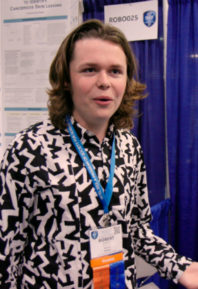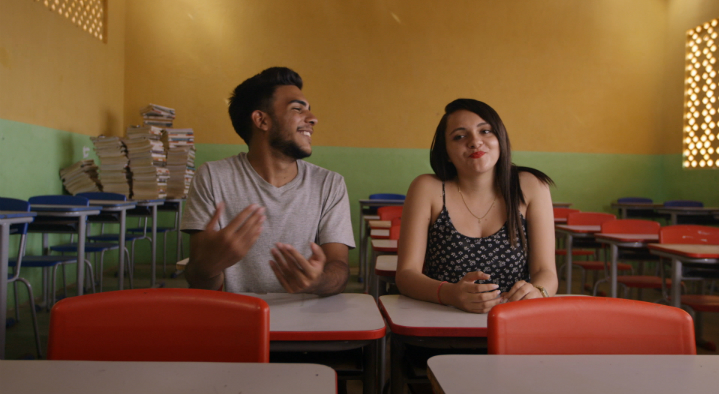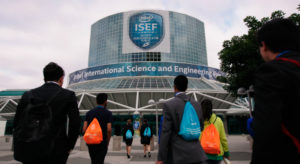
Populist movements are on the rise around the globe, and they’re doing so by rallying against elitism. Being anti-elite doesn’t mean being anti-financial one-percenters. After all, our friends to the south elected a rich narcissist who brags about his wealth at political rallies. Instead, anti-elite means anti-intellectual. A demagogue can’t rise to power on the back of fake news and alternative facts if their base reads books, know their history, and stays woke.
Today, people wear their stupidity like a badge of honour, and with each passing day it feels more like we’re destined to fulfill the prophetic vision of Mike Judge’s 2006 film, Idiocracy. But Science Fair, co-directed by Cristina Costantini and Darren Foster, offers a reason for hope. The documentary presents the world of science fair competitions and profiles the brilliant teens striving to take home top honours with projects that make the world a better place.
Costantini and Foster don’t waste any time throwing us into the compelling world of high school science fairs. Right away we meet Jack, a super-smart, shaggy-haired, adolescent banshee. To be fair, the kid is about to experiences the biggest moment of his young life. Jack scream-squeals with elation, tears flowing down his face, first prize ribbons fluttering along his lapel as he wins the 2012 Intel ISEF (International Science and Engineering Fair) competition. ISEF is the Olympics of high school science fairs, and it’s a huge deal. Along with Jack’s $75,000 prize comes other perks like meeting President Obama and a profile on 60 Minutes.
Each year, ISEF hosts the best and brightest students from over 75 nations, and braniacs in the world’s most elite institutions spend their entire high school careers working towards qualifying for the competition. One student compares her classmate’s rivalries for ISEF qualifying spots to lobsters in a tank crawling over each others’ backs trying to escape. Science Fair tracks nine high school students from different countries, and showcases the hurdles they must overcome to qualify for the grand competition.
Early on in Science Fair, the filmmakers follow a handful of teenagers, reveal their backgrounds, and observes the work they put into qualifying for ISEF. The students come from many different backgrounds, and their stories feel distinct from one another. My biggest gripe with the film is that by profiling nine kids, the doc speeds through their stories and left me wanting to learn more about their them. One student’s ISEF accolades take a backseat to her school’s sad sack football team (with a 0-9 record). I wanted to know about her pursuit of ISEF at a school that doesn’t seem to value her impressive academic achievements.
Each subject the film highlights has an intriguing story. There’s Ivo, a lanky 18-year old from Lorch Germany. His field is aviation, and his project, a flying wing-style aircraft looks like something out of a sci-fi movie. Robbie is a programming whiz who isn’t great in a classroom environment. He may not bring home grades above a C, but he mods his calculator to read out sick burns in Shakespearean English. And in the small town of Iracema, Brazil, population 14, 000, is Myllena, whose entry at ISEF qualifications is a formula to halt the spread of Zika virus. They’re all a cut above that old science fair staple of baking soda and vinegar in a volcano.
The second half of the film follows the students after they pack up and head to Los Angeles for the competition. Things get intense as they must juggle last minute adjustments to their work, refining their pitches, and mingling with other competitors. The film loses some of its spark in the second half. While it’s fun watching the high schoolers step up to ISEF’s big stage, these moments lack the appeal of seeing them operate on their own turf. The best bits of the film are when these intensely driven kids toil away at home, and have exchanges with family, friends, and their teachers.
I would be happy to see any one of these kids take home top honours, but I walked away from the film understanding that none of these kids – even the ones that don’t place – have somehow lost the competition. In life, many successful people – journalists, business owners, famous actors – struggle with imposter syndrome. It’s the feeling that you’re a fraud or don’t deserve your career status. It causes persistent anxiety over people finding out you’re not as smart, confident, or competent as you appear. Events like ISEF, embolden its young competitors and provides a focal point for their limitless potential. It places competitors upon a confidence-boosting pedestal, validates their hard work, and inspires their continued pursuit of success.
Costantini and Foster highlight the phenomenal (and often selfless) work teenagers around the globe put into fixing the mess that previous generations left behind. As Americans rally to build walls, restrict citizenship, and bring back coal mining jobs, there’s a certain satisfaction to watching Latinx, Muslim Americans, and second-generation citizens – the people conservatives want to keep out – excel at the highest academic levels. Science Fair is the perfect remedy for those suffering from 2018’s anti-intellectual crisis. It’s a fun, uplifting watch, filled with teens who are as hardworking, thoughtful, and charming as they are inspiring.
- Release Date: 11/02/2018



